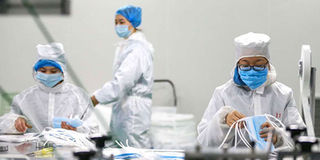China hopeful of defeating coronavirus

Workers produce protective face masks at a factory in Qingdao in China's eastern Shandong province, on February 6, 2020, to support the supply of medical materials during a virus outbreak that originated from Hubei's provincial capital city of Wuhan. PHOTO | AFP
What you need to know:
- By January 29, more than 6,097 medical staff and professionals from other cities are working in Wuhan and other regions in Hubei.
- Top priorities for local governments include identifying and caring for symptomatic patients and advising and monitoring people with Wuhan travel records to self-quarantine.
The coronavirus disease first diagnosed in Wuhan City, China, in December is an international concern that requires global efforts to combat.
China has put in place a nationwide emergency management system driven by the central government in collaboration with local authorities to battle the epidemic, to which the international community is paying close attention.
The Chinese government is working closely with the World Health Organisation (WHO) on the issue. On the evening of January 30, the WHO declared the 2019-nCov epidemic a “public health emergency of international concern (PHEIC)”.
China’s mainstream media reported the news instantly, indicating that the Chinese people are confident of conquering the epidemic.
This is manifested by a full quarantine on Wuhan City announced about two weeks ago, when public transport was grounded, schools suspended and public gatherings banned.
QUICK ACTION
On Sunday, Wuhan authorities delivered the 1,000-bed Huoshenshan Hospital — which was built from scratch within 10 days — with 1,000 beds, to the military medical teams as the first special coronavirus hospital. It started receiving patients on Monday.
Had the Chinese government not taken quick action, the deadly virus could have spread all over the world with a devastating impact on the global economic and public health systems.
WHO Director-General Tedros Adhanom Ghebreyesus pointed out at a press conference on January 30: “The Chinese government is to be congratulated for the extraordinary measures it has taken to contain the outbreak, despite the severe social and economic impact those measures are having on the Chinese people.”
Rapid mobilisation at the top level by the central government catapulted the entire nation into instant reaction.
By January 29, more than 6,097 medical staff and professionals from other cities are working in Wuhan and other regions in Hubei.
Medical supplies — including face masks, protective suits, and medicines — are arriving in areas hit by the epidemic.
TOP PRIORITIES
The Ministry of Industry and Information Technology has urged medical suppliers across China to restore their full capacity to ensure sustained provision of all necessary items.
Food and other life necessities have been sent to Wuhan for the nine million residents.
All the 31 provinces and municipalities, including Beijing and Shanghai, have taken serious measures on first-level response to this major public health emergency.
Most of the confirmed cases reported in regions other than Hubei are imported infections — patients have either travelled to or lived in Wuhan or come into close contact with infected victims. There has been no epicentre of outbreak, except in Wuhan.
For now, top priorities for local governments include identifying and caring for symptomatic patients and advising and monitoring people with Wuhan travel records to self-quarantine.
PARTNERSHIPS
Restrictive measures such as migration control and mass quarantine may lead to social disorder, which requires appropriate responses from the local authorities.
China is doing everything within its means to prevent and control this epidemic.
The Chinese government is working closely with Kenya’s — including the ministries of Foreign Affairs, Health, and Transport — in a bid to contain the spread of the epidemic.
I am deeply impressed by the measures taken by Kenya to lock out this epidemic, including through thorough screening of passengers arriving from the affected countries.
On Sunday, the Health ministry reassured Kenyans that there was no confirmed case of coronavirus pneumonia in the country then.
From the embassy, we are monitoring the entry of our nationals into the country and have instructed them to adhere to the prevention and control measures. There is no case of the disease among Chinese in Kenya.
STUDENTS' SAFETY
I fully understand the concerns and fears of families of Kenyans living or studying in China.
I wish to assure all that the Nairobi embassy is in close contact with the Chinese central and local authorities monitoring the Kenyan nationals in China, particularly students in Wuhan. They are safe.
Some universities and other institutes have done a very good job. Wuhan Botanical Garden of Chinese Academy of Science does regular services, including sterilising student apartments, monitoring students’ health and enhancing maintenance to ensure water and electricity supply.
China Central Normal University (CCNU) ensures there is food and other daily necessities for foreign students.
In case of need, please contact us through our website, Twitter and Facebook accounts. As President Xi Jinping assured Dr Ghebreyesus in Beijing, the people’s safety and health always come first.
Mr Wu is China’s Ambassador to Kenya. [email protected].




